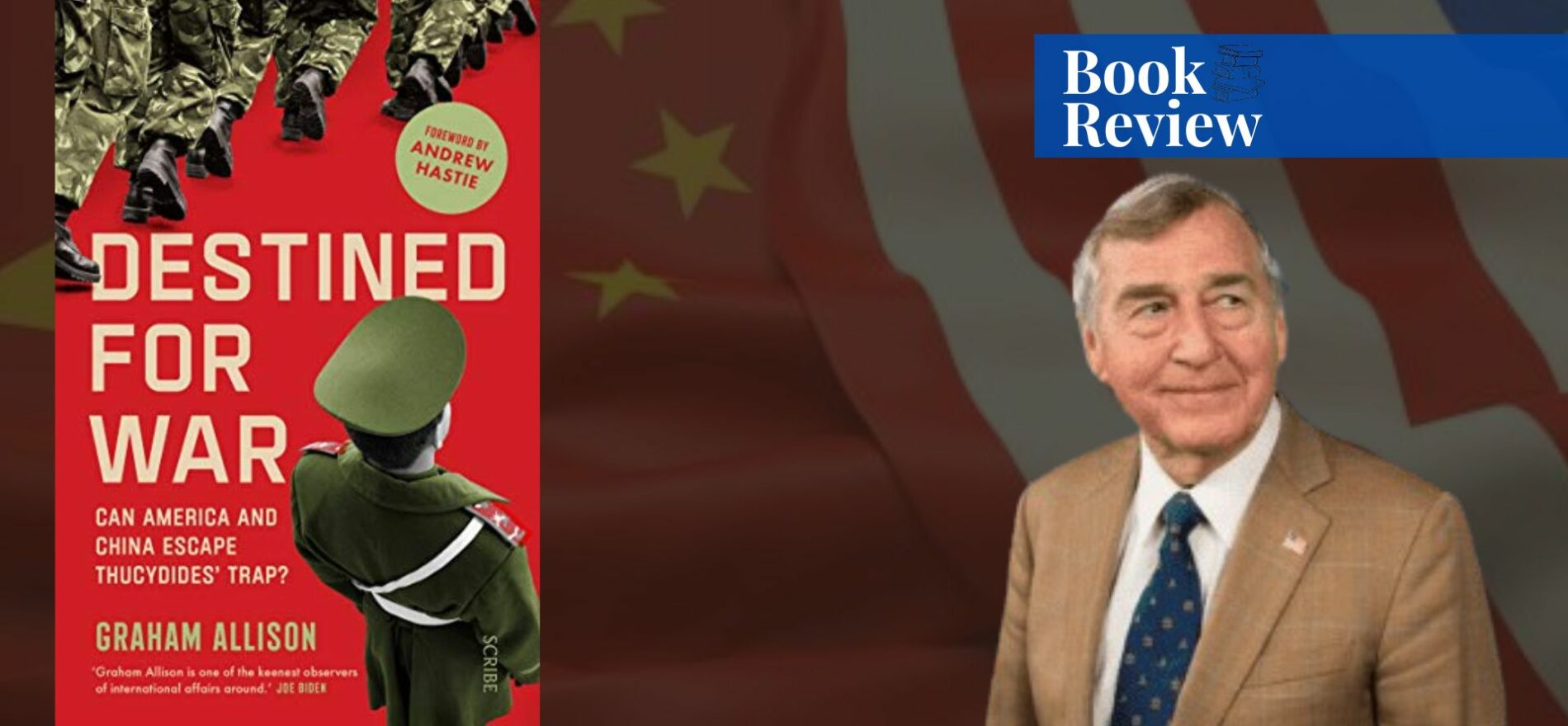Mr Muhammad Shehryar is currently pursuing his Bachelor's in International Relations at the University of Peshawar.
Various dominant powers have molded and dominated the global order throughout history, with other states supporting them. In Destined for War: Can America and China Escape the Thucydides’s Trap, Allison states the United States enjoys hegemony, but this system is under threat from various rising nations, particularly China. China’s ambitions to recapture greatness have alarmed the White House. This is reminiscent of Trump’s “Make America Great Again” election campaign slogan, which had strained US relations with many states.
The dispute in the South China Sea is rising, potentially leading to a dangerous clash between the two countries. The ongoing worldwide discussion concerns whether China and America can avoid Thucydides’s Trap, a situation in which war between an existing and rising power becomes unavoidable. Allison claims that war between the United States and China is unavoidable, and cautions that historical trends show states stumbling toward conflict due to escalating incentives beyond political control.
Despite leaders’ aversion to violence, historical ties and trust deficits might accidentally lead to armed confrontations. The author urges both countries’ presidents to adopt foreign policies that promote peace, asking them to learn from previous mistakes to prevent their countries from repeating the tragic cycle of conflict. The American order has dominated the world’s events for over a century. However, the rise of China has instilled fear in the United States, creating a toxic cocktail of arrogance, pride, and paranoia that might result in conflict.
The Thucydides Trap highlights the deadly dynamic that occurs when an ascending power, like Athens or Germany a century ago, or China now, challenges an established power, such as Sparta or Britain in the past, or the United States today. Henry Kissinger suggested that embracing Thucydides’s Trap concept offers a valuable perspective, acting as a lens to cut through the noise of daily news and comprehend the underlying dynamics.
Destined for War serves as a strategic guide for serious readers seeking to navigate and understand the complexities of our seemingly chaotic world. Historians, politicians, and scientists frequently seek insights from both the past and the present to derive generalizations or principles that can guide leaders in future decision-making.
This book meticulously explores the last 500 years of history, identifying 16 situations in which the rise of a power posed a threat to an established power, with twelve of these examples resulting in war. When third-party provocations induce reactions, a spiral begins that accidentally draws both powers into an undesired territory.
In the contemporary global power equilibrium, China adopts a revisionist perspective, contending that the current world order was established during a period when China was a weaker nation and not significantly engaged internationally. Reflecting on its past, China, once a dominant force, has experienced subjugation by Western powers, a viewpoint that resonates with both the Chinese authorities and its populace. Unlike the United States, which promotes universalism and works to spread its culture around the world, China is more internally focused.
China acknowledges a historical oversight in neglecting its maritime interests, viewing war as a last resort in conflict resolution. As a result, under Xi’s leadership, there is a concerted effort to strengthen the People’s Liberation Army’s (PLA) naval, air, and missile capabilities while simultaneously reducing ground forces. Xi Jinping’s efforts are centered on the goal of restoring China’s greatness. Specific goals and timelines have been established to achieve this vision.
China aims to be the dominant force in the primary markets of ten leading technologies by 2025. Looking ahead to 2035, the goal is to establish itself as the leading innovator in all advanced technologies. As a result of these ambitions, China aims to unambiguously claim the top spot by 2049, coinciding with the 100th anniversary of the People’s Republic, encompassing not only economic domains but also asserting supremacy, including military strength.
Allison goes on to outline China’s grand strategy, identifying four primary goals that shape the country’s overall strategic vision, which is restoring China to its pre-West Asian dominance, reestablishing China’s former territories, as well as territories for which China is also seeking their former sphere of influence and national prestige. While describing China’s revival strategies, he also provides a more comprehensive account of the similarities and differences between the US and China’s foreign policies, claiming that both are prisoners of their extreme superiority complexes, with one seeing itself as the beacon for the world and the other going even further, seeing itself as the unique link between humans and heavens and seeing everyone else as barbarians.
America is a democratic country with an open political and economic system, whereas China is an authoritarian with legitimacy derived from competence in performance. Both have distinct values. Americans perceive their cultural principles as globally relevant and actively export these ideals abroad, while China adopts a more introspective stance, refraining from disseminating its values or interfering in foreign affairs.
The diverse American populace primarily comprises immigrants, in contrast to China’s predominantly native-born citizens. Moreover, China’s governance structure is highly centralized, as opposed to the more restrained governmental authority in the United States. China believes in harmony and order through domestic hierarchies. The approach taken by China is “unashamedly realpolitik” which allows the Chinese government to be very flexible without considering the need to justify its actions. America’s perspective is conflicted; it wants an international “rule-based” order with rules that conform to its own domestic rules.
The United States has a genuine political understanding of “might is right.” The Chinese are skeptical of the US’s “rule-based” order arguing that they were not part of the global arena when these norms were established. In contrast to 2004, when the US economy outstripped China’s, the two nations reached economic parity a decade later. By 2024, projections indicate that China’s economy will surpass that of the US. Moreover, China has established itself as a key trade partner with all principal Asian states.
Considering the above factors, it appears almost inevitable that China and the US are on a collision course, compounded by their disparate geographical positioning, divergent historical contexts, and incongruent perceptions of reality, leaving them without a neutral baseline to resolve their disagreements. The US didn’t face a problem that was not soluble by the mobilization of resources and never needed a strategic vision.
The nature of the conflict between China and the United States is very different. China does not bet everything on a single battle. China may improve its position and believe in defeating the enemy without ever fighting. China frequently employs its military against opponents who are equal to or stronger than it, possibly as a surprise. China will be patient as they gain an advantage in Asia.
China may show reluctance to engage in deadly confrontations with the United States, given the assessment that it may require over ten years for China’s military capabilities to be on par with those of the US, even within proximate regions. Allison raises concerns that should current trends in the South China Sea prove disadvantageous for China, this may provoke a detrimental response against Chinese interests, alongside challenges to broader US influence.
Conversely, the United States is also averse to warfare. Since World War I, it has experienced victory in only one out of five major wars it has participated in. The desire among the American populace to avoid further casualties is a significant deterrent against entering into conflict.
There are numerous events that could spark a war between China and the United States, including an unintentional collision in the South China Sea, Taiwan’s declaration of independence, and a war provoked by a third party. China has engaged in substantial infrastructure development on its islands to enhance its monitoring capabilities. Continuous intelligence confrontations persist between China and the United States, with China endeavoring to impede American surveillance efforts.
Allison additionally offered some clues for American politicians seeking to make China’s rise a case of no war: higher authorities can assist in resolving rivalry without resorting to war. States can become embedded in large economic, political, and security institutions that constrain previously normal behavior. Wise statesmen make a virtue of necessity by distinguishing between needs and desires. Economic interdependence raises the cost of war while decreasing its likelihood.
Along with hints for US leaders, Allison has also proposed strategies for the US to address the ascendant China, which are to accommodate, undermine, negotiate a long peace, and redefine the relationship. He also added that the US should face up to the realities of the situation, recognizing that there is no solution to China but rather a condition that must be managed over time. Furthermore, he suggests that all options be considered and that trade-offs be accepted.
Allison underscores the mutual objectives between China and the US in mitigating climate change, averting nuclear catastrophe, and curtailing international terrorism, advocating for a US strategic plan beyond mere reliance on the current state, hoping for optimal outcomes.
If you want to submit your articles, research papers, and book reviews, please check the Submissions page.
The views and opinions expressed in this article/paper are the author’s own and do not necessarily reflect the editorial position of Paradigm Shift.



















